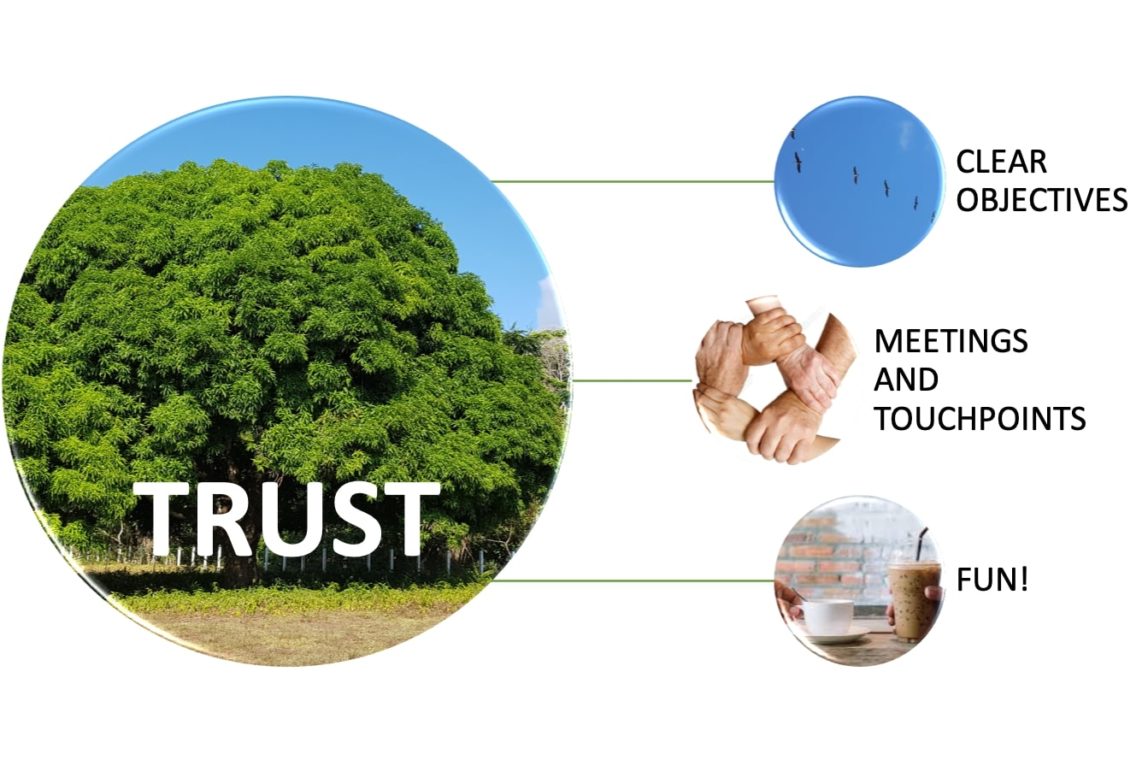In this moment of pandemic, I often have to give moral support to my daughter who has the misfortune of spending her semester abroad in Milan. In fact, “semester abroad” is a figure of speech because my parents, my brother and his family are from Milan and live in Milan, hence Italy is not really a foreign country for my daughter. For over two weeks, the Milanese have been forced to stay home and can only go out to do their home shopping. This has a deleterious impact on morale: my poor Chiara is getting depressed, but I also see that the relationships between the members of my family, who are forced to live together indoors, are starting to suffer: there are squabbles, they are nervous and they struggle to overcome the relentless wave of boredom.
On a professional level, a director of human resources in New York told me that as of this week, the 700 people who make up her business have been working from home. After a few days of remote work, they asked the employees how they were doing. They gave the following feedback: we are concerned that we no longer see our colleagues around the coffee machine, we are isolated and we feel isolated.
What happens? Why are they depressed?
Social bonding is vital for all of us
The World Health Organization considers social bonding one of the three pillars of individual good health. From the moment we come into the world, we develop through social ties: first with our mother and then, as we grow, with more and more people who take care of us, educate us, become our friends and, later, our colleagues.
Numerous studies (see the link below) show that social relationships – both quantitative and qualitative -influence mental health, behavior related to one’s own health, physical health and the risk of mortality in human beings.
For example, it was shown that less socialized men and women are twice as likely to die as compared to more socialized adults. Among adults with coronary heart disease, socially isolated people have an increased risk of cardiac death.
The social bond is therefore positive and vital for all of us. This is why when we are deprived of this bond we are no longer fit. Maybe we don’t feel the effect after a very short period, but after a week or two the situation becomes burdensome. The “Milan case” proves it.
What is a social bond?
Every day we interact with a multitude of people: we talk with our families, friends, colleagues, the cashier of the local supermarket … Longitudinal studies (which study the same people for several years) on people who live longer have shown that what makes the difference is the QUALITY of these relationships.
Having good quality relationships means, in particular, experiencing the following emotions:
- Feeling safe
- Feeling supported
- Laughing and crying together
- Cooperating with others
- Feeling useful
- Feeling appreciated
- Feeling happy for others
These good relationships have the following effects on our physique:
- We produce dopamine and oxytocin, the substances that regenerate our body and contribute to our health
- Our immune system is strengthened (and right now we need an army inside our body!)
- The secretion of cortisol (the stress hormone) normalizes. And now with all this stressful news, we certainly need to regulate it!
It is therefore urgent, at a time when we all have to reduce physical contact, to find solutions to maintain social bonds: this is the best way to stop the virus while we wait for the vaccine! Furthermore, both positive and negative emotions are contagious, and now more than ever we need to spread the antidote of positive emotions through social contact!
So how do you keep social ties from waning when you are forced to work remotely?
Italians, thanks to their well-known creativity, found social links on balconies. By following this link you can appreciate the emotion aroused in other countries:
https://www.vox.com/culture/2020/3/13/21179293/coronavirus-italy-covid19-music-balconies-sing
Obviously, this solution is not applicable on the workplace, since every employee is at home and everyone is geographically dispersed.
The suggestions that you will find below are the result of my seven-year experience working with a remote team. I travel between Europe and New York, I have teams in both continents as well as a network of coaches all over the world (www.welead-coaching.com). Therefore, I had to find solutions to stay in touch with all the colleagues with whom I work.
And here’s what I put into practice:
1 / First of all you must TRUST OTHERS: you cannot manage a person who is far away as you would manage a person who works with you in the same place. This trust is not innate and does not come spontaneously. It is built day by day thanks to the following practices:
- Define clear, explicit and shared WORK RULES. These rules concern what you consider important, your values and the behaviors that derive from them. For example, with my coaches who work for me all over the world, I establish the rule of transparency. In case of problems with a customer or the local company, they must notify me very quickly by email or message. I tell them that I don’t want to find out the problems through my client. I want the coach to warn me before this happens. With this rule I add the following words: in our profession everyone can be wrong or have difficulties or have questions that do not have immediate and obvious answers. I will not criticize a coach if at some point he/she is in an impasse or says he/she has no answers or has made a mistake. On the contrary, for me this is an important quality and a sign of maturity. However, if the coach doesn’t share his problem with me in advance, I may lose confidence.
- I am consistent with what I say: as soon as they report a problem, I quickly find a moment to call them, listen to them and together we find a solution. Sometimes their problems worry me, but I always ask myself the following question: would you prefer to have them talk to you about a problem and face it squarely or have them cover it up until one day the customer calls you to say that he is not satisfied? I know the answer. It also means that I will never make my coaches feel guilty about their mistakes, but will always be ready to find a solution together.
- To build trust, you also need to know how to GIVE UP that form of power which consists in closely controlling what your collaborator does. When you work far away (and even close by!), this kind of power simply doesn’t work because you can’t exercise it, you’re not there! So better get rid of it. Concentrate your energies on sharing goals, encourage, solve problems with your collaborators, give feedback very often, in short give them the desire to work together, make them feel responsible for their goals and learn how to improve their work.
2 / Clear rules go hand in hand with CLEAR AND SHARED OBJECTIVES. Sharing also means discussing objectives. To create trust, your collaborator must feel responsible for his goals and in order to obtain this result, you must avoid the trap of imposing your goals on him/her. If you do, you will get exactly the opposite result: since these are your goals and not the collaborator’s, the latter will not feel responsible. Another point: when working from afar, it is much better to set goals for the following month, or even the following three months. It is better to adopt a step by step policy that allows collaborators to have achievable goals and therefore maintain trust, rather than pushing them towards distant goals that make no sense to them. The less opportunities you have to meet in person, the more the goals should be relatively short-term, with frequent contact points to adjust them and enrich them to move forward. This does not mean that you don’t have to have an overview of long-term goals. The trump card is an “AND” logic: giving a broader vision AND objectives on an ongoing basis.
3 / Create MEETINGS adapted to the need for contact that will allow your collaborators to feel part of a team, even from a distance. These long distance meetings are essential, much more so than if you worked in the same office, because they favor connection, exchange, sharing. Remember that if you don’t hold meetings, people will quickly feel isolated, which will lead to depression and hence decreased efficiency in their job. Furthermore, these meetings will fuel closeness, which will in turn encourage mutual trust. Do you see the virtuous circle?
In general, here is how I structure video conferencing meetings with my remote teams:
- WEEKLY TEAM MEETINGS – OPERATIONAL, if possible at the beginning of the week to discuss together the work to be done over the week, to share everyone’s objectives and projects. This allows everyone to have a vision of what others are doing, which results in a sense of community, of bond.
- TWO / THREE IMPROMPTU, OPERATIONAL, DAILY MEETINGS – to resolve specific issues.
- DAILY ONE-TO-ONE CALLS – with your collaborators to help them move forward, give them feedback, support them, solve problems.
- TEAM MEETINGS ON SUBSTANTIVE ISSUES once a month or whenever it is necessary to reflect on medium-long term topics. For example, with my team we discussed whether we would create a company dedicated to a project and we set up a special meeting to take this decision together.
Note that:
- Your virtual meetings need to be more frequent but also shorter, otherwise everyone will start doing their job in multitasking, which is equivalent to wasting time.
- A 100% presence is essential to create social bonds!
- Do not exceed 1h30 for the weekly meeting. For the others, stay on formats of maximum 30-45 minutes.
- In the meetings chapter we must also add the creation of AN OPEN CHAT SYSTEM. I use Whatsapp with my coaches: they know that they can write to me at any time and that I will answer within 2 hours to organize a call or a mini-meeting. In a team, a chat that’s visible to everyone will allow team members to stay in touch, quickly resolve operational questions and build trust since everything is transparent.
And the fun in all this?
For the fun part, I have found inspiration in my Italian friends who, forced into confinement, have had to give up the famous “cocktail hour” with their friends. Since Italians don’t lack creativity, I have seen on socials that some of them have decided to meet for a virtual “cocktail hour” where everyone connects on video sitting on the sofa while holding a glass of wine and chats with friends.
Do the same thing: for example, every morning, connect with your team for 10-15 minutes with a cup of coffee in your hand and wish everybody a good day, have an informal exchange, create closeness. Likewise, celebrate birthdays and beautiful occasions. The more informal moments you create, the more your team will feel trust and be motivated to work together.

What if the curfew continues?
We are facing a moment when everyone faces the unknown. In reality we know nothing: neither when it will end, nor the real consequences. The unknown generates anxiety and fear. The only thing we can be sure of is the quality of the social bonds that we will create and maintain. And it is also the best antidote to give you courage without succumbing to anxiety. The good news is that it all depends on us: we can control the quality of our relationships with our loved ones and the people we work with, so I invite you to focus your energies on something that makes you feel good!
Bibliography
Social Relationships and Health: A Flashpoint for Health Policy, Debra Umberson and Jennifer Karas Montez: https://www.ncbi.nlm.nih.gov/pmc/articles/PMC3150158/
World Health Organization: https://www.who.int/hia/evidence/doh/en/
Harvard Business Review: How to Get People to Actually Participate in Virtual Meetings, Justin Hale and Joseph Grenny, March 2020



